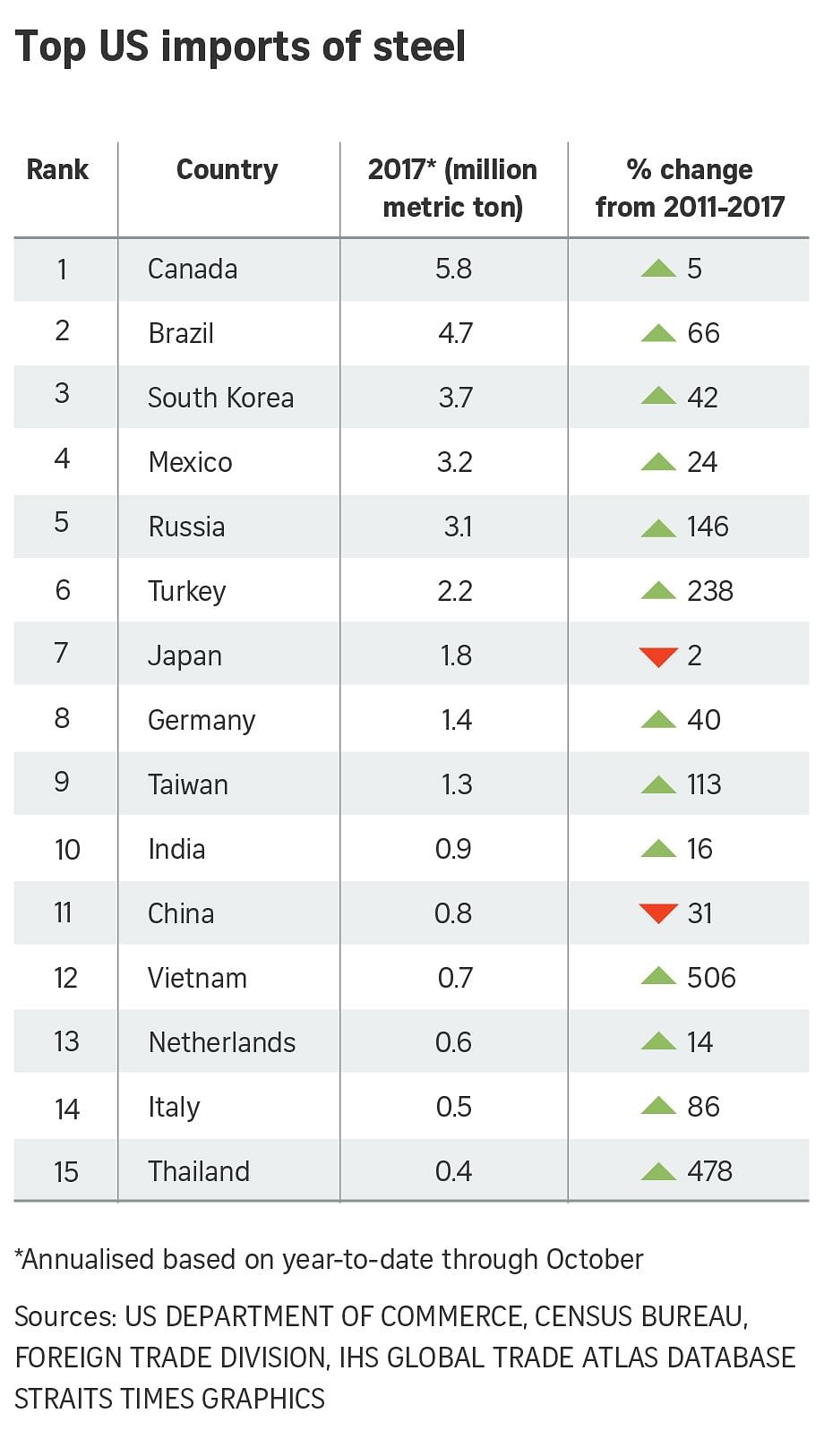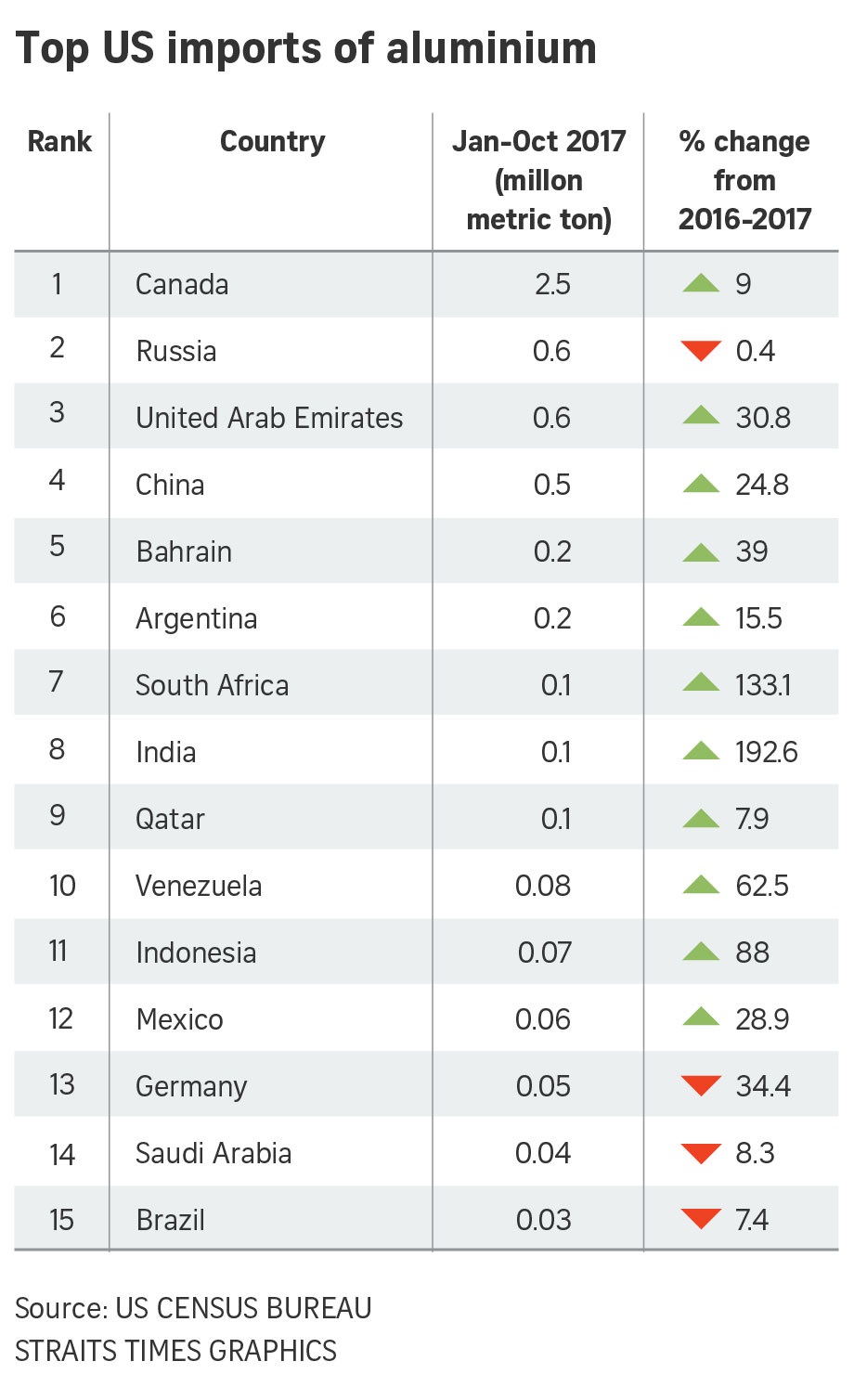Winners and losers from Trump's new tariffs on aluminium and steel
Sign up now: Get ST's newsletters delivered to your inbox
Follow topic:
WASHINGTON (BLOOMBERG) - United States President Donald Trump said on Thursday (March 1) that he plans to impose 25 per cent tariffs on steel and 10 per cent on aluminium imports.
If he gets his way, the policy could have sweeping ramifications across the globe.
Tariffs may benefit US steel and aluminium producers, but also raise the possibility of retaliation from other countries and higher costs for American shoppers.
Here are some of the likely winners and losers.
WINNER: US STEELMAKERS
Producers such as Nucor, AK Steel Holding and US Steel will reap the benefits. They have aggressively lobbied for trade defences against what they see as unfair competition from China, Russia and South Korea.
A tariff around the level currently discussed - 25 per cent on steel and 10 per cent on aluminium from all countries - is expected to drive up US steel prices.
Domestic hot-rolled coil, an industry benchmark, has already rallied in anticipation, reaching about US$780 a tonne, according to Metal Bulletin prices.
WINNER: ARCELOR MITTAL
The steel-making giant is also a major producer in the US, and supplied building material for New York's One World Trade Centre.
It has long argued for trade defences to protect its core markets, and tariffs would be a big positive.
But, depending on how the rules are applied, it may face higher costs. For example, it is unclear if ArcelorMittal's imports of steel slabs from Brazil to its plant in Alabama would be subject to tariffs.
LOSER: US NEIGHBOURS
While China has long been the bogeyman of the steel industry and scorned by politicians for flooding the market with cheap products, it is not the biggest seller into the US. That title goes to Mexico, Canada and Brazil.
LOSER: GLOBAL RELATIONSHIPS
Other countries are already talking about the possibility of retaliation.
In China, one of President Xi Jinping's top economic advisers has been dispatched to the US in an attempt to defuse tensions.
China is investigating US imports of sorghum and studying whether to restrict shipments of US soya beans.
The European Union has said it will take action if "unjustifiably hit" by the tariffs.
LOSER: SOUTH-EAST ASIA
South-east Asian markets probably will have to absorb the redirected steel flows. The global steel industry has been described as a game of whack-a-mole - when exports are blocked in one country, they end up shifting somewhere else.
One way this could play out: Asian companies that used to sell steel to the US could find their product uncompetitive because of the tariffs. So, instead, they have to turn to other markets in the region to offload the product.
LOSER: ASIA STEELMAKERS

Shares of steelmakers JFE Holdings and Kobe Steel are already showing signs of stress.
The Bloomberg World Iron/Steel Index of 65 producers around the world is headed to a third straight loss.
LOSER: US ALUMINIUM USERS

For makers of beer cans, airplanes, cars and other materials, the consequences of the tariffs "could be severe" as they face higher cost, with limited ability to pass that on to their consumers, said Darwei Kung, the head commodities portfolio manager at Deutsche Asset Management.
They also stand to lose market share as overseas suppliers bring their products into the US at lower cost, he added.
For US auto dealers hit by flattening sales in recent months, the timing of metal tariffs could not be worse, according to Cody Lusk, president of the group that represents non-US brand retailers.
US automakers' shares - already slipping because of weak February sales - extended declines after Trump's comments.
"These proposed tariffs on steel and aluminum imports couldn't come at a worse time," said Lusk. "Auto sales have flattened in recent months, and manufacturers are not prepared to absorb a sharp increase in the cost to build cars and trucks in America."
Five of the six biggest car manufacturers on Thursday (March 1) posted lower February deliveries than a year ago. GM shares slumped 4.5 per cent as of 2.30pm in New York, while Ford and Fiat Chrysler both dropped about 3.5 per cent.
But history shows that imposing tariffs to protect one industry often results in pain for another. According to industry groups, some 6.5 million people are employed in the US in businesses that use steel and aluminium, Financial Times reported.
Global Automakers said that President George W. Bush's 2002 steel tariffs cost the economy 200,000 jobs, including 30,000 in Michigan, Ohio and Pennsylvania.
Rio Tinto Group may join the losers' list unless Canada can wrangle an 11th-hour exemption. The global mining giant is a major aluminium producer in Canada and ships metal to the US.
Hamilton-based steelmaker Stelco Holdings also serves customers in the US. Its shares fell as much as 6.1 per cent on Thursday.
IT'S COMPLICATED: US FACTORY WORKERS
Republicans in steelmaking states such as Pennsylvania, Indiana and Michigan will have a good message to take home in the 2018 midterm elections.
Protecting blue-collar workers was one of Trump's key election promises, and this could be a success for the party, despite delays in their other legislative ambitions.
In the longer term, there could be mounting pressure for manufacturers who have to pay more for steel and aluminium.
They employ more workers than steel and aluminium mills, and Anheuser-Busch InBev has already urged Trump to reconsider. The Budweiser brewer said higher US aluminium tariffs could cost thousands of US jobs and raise costs by millions of dollars.

